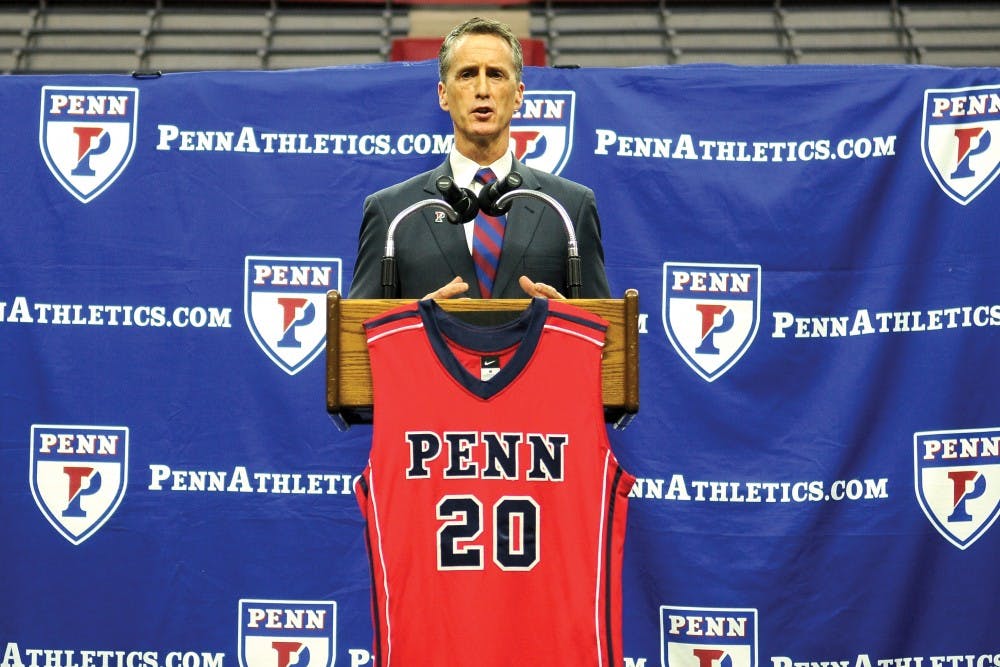
Penn coach Steve Donahue takes a seat in the Palestra stands, overlooking a pick-up basketball game featuring two of his assistant coaches. Donahue wears a Penn T-shirt and is getting ready to jump into the game himself.
For a man looking to turn around a struggling program, the new face of Penn basketball fittingly doesn’t plan on sitting still.
It’s been barely a month since Athletic Director Grace Calhoun announced that Donahue would succeed Jerome Allen as the Quakers’ new coach. Calhoun has acknowledged the importance of having success with the program’s third coach since Fran Dunphy’s departure less than a decade ago.
“We’re coming off the losingest period [in program history],” Calhoun said. “We’ve had two coaches now that arguably have not done what they have needed to do, so I don’t know that Penn can endure a third coach that’s not successful.”
One of the first steps toward success for Donahue was putting together a new staff of assistant coaches, one which looks almost identical to Penn’s previous staff. Mike Lintulahti is out as the volunteer assistant and Joe Mihalich has taken his place, but Donahue retained both full-time assistants, Nat Graham and Ira Bowman.
Of course, the former Cornell and Boston College head coach has plenty of familiarity with both men, having coached them during his time as an assistant at Penn while also employing Graham as an assistant during his previous head coaching stops.
“Obviously I know them very well, but I said this to them, ‘I’ve got to interview you,’” Donahue said. “I’m going to sit with you for three hours and really go through it.”
Donahue also spoke with current players and recruits to see if they received Bowman and Graham well, which he said was answered with a “resounding yes.”
Graham and Bowman are both familiar faces, and Donahue is also beginning to bring plenty of new ones into the fold. Beyond a strong recruiting class, Penn basketball will now have its own director of basketball operations after previously sharing one with the women’s team.
The move helps the staff focus on actually coaching players and getting on the road recruiting instead of handling the miscellaneous tasks that can otherwise slow down a coach.
“The fact that we could have a full-time operations position and other schools did and we didn’t left me thinking we can’t say this program is important to us and not put our money where our mouth is,” Calhoun said.
Calhoun said that a lot of the clerical work had previously fallen on Allen and the assistant coaches, something that will not burden Donahue.
But the changes to the program go far beyond someone handling the periphery tasks. Donahue also reached out to Penn students through math professor Nakia Rimmer, looking to build a staff of undergraduates that can work on analytics. Between 30 and 50 students signed up according to Donahue, giving the new coach a wealth of talent from which to choose.
“I’d be foolish not to utilize the resources here and the type of kids you get at this place,” he said. “As I said in my press conference, [the Palestra], the Big 5, these things aren’t good enough to win the Ivy League. You’ve got to be really sharp.”
By going to the student body for help, Donahue is also increasing engagement with the Penn community, something that is essential to help turn around lagging attendance numbers. The new coach has already started placing an emphasis on student engagement, discussing possible events involving the team while also speaking with the Red and Blue Crew.
“It’s a multiple facet thing that you do, but it has to be at the forefront of what you do,” Donahue said about working with the community. “There are a lot of reasons we do what we do, the way we play. It’s all because it’s fun to come and watch us play: The type of kid we get, the style we play, the way we interact with everybody.”
That style of play will certainly contrast with past versions of Penn basketball, placing an emphasis on high percentage shots that one would expect from a coach working with analytics.
Donahue explained that he wants his players looking for layups or dunks where there is a 90 percent chance or better that they score or get fouled. If that’s unavailable, standstill three-point shooting and offensive rebounding become focal points.
And on the defensive end, Donahue preaches the reverse: preventing easy shots at the rim, three-pointers and those pesky offensive rebounds.
The only way that style of play can be properly implemented is if the players buy into the system. After an emotional exit for Allen, Donahue immediately cultivated a relationship with the Quakers.
“First step was developing a relationship with the players,” Donahue said. “I thought that was the most important thing. You’ve got to build some trust in a short period of time because they leave for the summer and we don’t have a lot of access [during the summer].”
With his limited practice time, Donahue has met with all the players, laying out the core values he preaches and making sure that the Red and Blue are fully on board.
While it will take time to see that new style of play, Donahue is simply taking it one step at a time.
For now, it’s back to his own workout and some pickup basketball.
The Daily Pennsylvanian is an independent, student-run newspaper. Please consider making a donation to support the coverage that shapes the University. Your generosity ensures a future of strong journalism at Penn.
DonatePlease note All comments are eligible for publication in The Daily Pennsylvanian.








